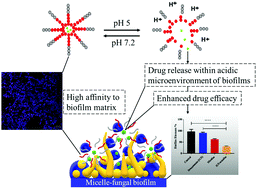Candida albicans (C. albicans) is a common fungal pathogen causing both localised and systemic infections. The majority of these infections are promoted by biofilm formation, providing a protective matrix for the embedded fungi thereby evading the host immune defence and promoting resistance against anti-mycotic agents. In this study, pH-responsive micellar systems based on poly-(ethylene glycol) ethyl ether methacrylate (PEGMA) and poly 2-(diethylamino) ethyl methacrylate (DEAEMA) block-copolymers of P(PEGMA-b-DEAEMA) were specifically developed and loaded with the antifungal itraconazole (ICZ) to defeat C. albicans biofilms. The P(PEGMA-b-DEAEMA) di-block polymer micelles demonstrated a particle size of 55 ± 6 nm and high ICZ loads (12.0 ± 0.5% w/w). Within the biofilm's acidic microenvironment, tertiary amines of the pH-sensitive DEAEMA block are protonated, altering their conformation and enhancing the release of the micellar contents. Encapsulation of ICZ within micelles significantly enhanced the activity against C. albicans biofilms, with a significant reduction in the biofilm biomass (>50%) and in the number of viable cells (2.4 Log reduction) achieved, compared with the non-encapsulated ICZ. Confocal microscopy revealed a high affinity and accumulation of the micelles in C. albicans biofilms as a result of their size and specific electrostatic interaction, hence their improved activity. P(PEGMA-b-DEAEMA) based pH-responsive micelles offer significant potential as antifungal carriers for controlling Candida infections.
